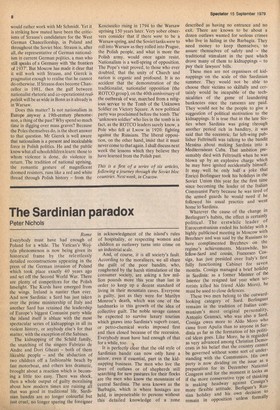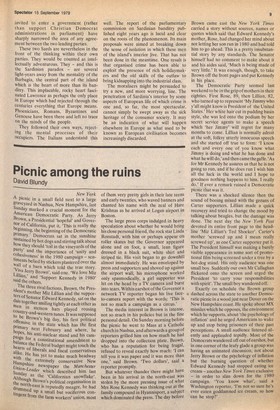The Sardinian paradox
Peter Nichols
Rome Everybody must have had enough of Poland for a while. The Vatican's Wojtyla phenomenon is now being given its historical frame by the relentlessly detailed reconstructions appearing in the press of the German invasion of Poland which took place exactly 40 years ago and set off the Second World War. There are plenty of competitors for the Polish limelight. The Kurds have emerged from the wings. Ireland is nastier than ever. And now Sardinia: a Sard has just taken over the prime ministership of Italy and another Sard has retained the leadership of Europe's biggest Comunist party while the island itself is ablaze with the most spectacular series of kidnappings in all its violent history, or anybody else's for that matter, with the exception of the Sabines.
The kidnapping of the Schild family, the snatching of the singers Fabrizio de Andre and Dori Ghezzi — both of them likeable people — and the abduction of two children off a fashionable beach by fast motorboat, and others less dramatic, brought about a reaction which is becoming a little too easy. There was shock, then a whole output of guilty moralising about how modern times are ruining all that was good in traditional life. Sardinian bandits are no longer colourful but just cruel, no longer sparing the foreigner in acknowledgment of the island's rules of hospitality, or respecting women and children as outlawry turns into crime on an industrial scale.
And, of course, it is all society's fault. According to the moralisers, we all share the guilt of the poor bandits, who, roughened by the harsh stimulation of the consumer society, are asking a few million pounds more this year than last in order to keep up a decent standard of living in their mountain caves. Everyone is guilty, just as they were for Marilyn Monroe's death, which was one of the landmarks in this growth of the idea of collective guilt. The noble savage cannot be expected to survive luxury tourism which gnaws into Sardinia's superb coast, or petro-chemical works imposed first and then closed because of the recession. Everybody must have had enough of that for a while, too.
It is perfectly clear that the old style of Sardinian bandit can now only have a minor, even if essential, part in the kidnapping business. The men who live the lives of outlaws or of shepherds still searching for new pastures for their flocks are the men who know the mountains of central Sardinia. The area known as the Barbagia, which is where hostages are held, is impenetrable to persons without this detailed knowledge of a 'zone described as having no entrance and no exit. There are known to be about a dozen outlaws wanted for serious crimes who live in hiding in the Barbagia. They need money to keep themselves, to assure themselves of safety and — the traditional stimulant in the past which drove many of them to kidnappings — to pay their lawyers' bills.
These men are not organisers of kidnappings on the scale of this Sardinian summer. They would not be able to choose their victims so skilfully and certainly would be incapable of the technicalities of the game of laundering banknotes once the ransoms are paid. They would not be the people to give a suggestion of political motivation to the kidnappings. It is true that in the late Sixties when Sardinia was going through another period rich in banditry, it was said that the eccentric, far left-wing publisher Feltrinelli was talking to the bandit Messina about making Sardinia into a Mediterranean Cuba. That ambition presumably died with Feltrinelli when he was blown up by an explosive charge which he may have ignited accidentally himself. It may well be only half a joke that Enrico Berlinguer took his holidays in the Soviet Union this year for the first time since becoming the leader of the Italian Communist Party because he was tired of the armed guards he would need if he followed his usual practice and went home to Sardinia.
Whatever the cause of the change in Berlinguer's habits, the effect is certainly political. The erstwhile leader of Eurocommunism ended his holiday with a highly publicised meeting in Moscow with Brezhnev and was said by the Russians to have complimented Brezhnev on the regime's achievements. Meanwhile, his fellow-Sard and cousin, Francesco Cossiga, has just presided over Italy's first fully functioning Cabinet for seven months. Cossiga managed a brief holiday in Sardinia: as a former Minister of the Interior (he resigned last year when terrorists killed his friend Aldo Moro), he must be used to close defences. These two men belong to the outward" looking category of Sard. Berlinguer remains in the tradition of Italian communism's most original personality, Antonio Gra.msci, who was also a Sard. Cossiga owes more to Aldo Moro who came from Apulia than to anyone in Sardinia as far as the formation of his political ideas goes. Like Moro, he is regarded as very advanced among Christian Democrats in his belief that the country cannot be governed without some sort of understanding with the Communists. His own party is now dividing on the issue .as a preparation for its December National Congress and for the moment it looks. as if the more conservative type of thinking is making headway against Cossiga s more flexible attitude. Berliguer's. Russian holiday and his own decision to remain in opposition unless formally invited to enter a government (rather than support Christian Democrat administrations in parliament) have sharply narrowed the area of any agreement between the two leading parties.
These two Sards are nevertheless in the front of the thinking within their own parties. They would be counted as intellectually adventurous. They — and this is the Sardinian paradox — are several light-years away from the mentality of the Barbagia, the central part of the island Which is the heart of more than its banditry. This implacable, rocky heart fascinated Lawrence as perhaps the only place in Europe which had rejected through the centuries everything that Europe means. Phoenicians, Romans, Byzantines and Genoese have been there and left no trace on the minds of the people.
They followed their own ways, rejecting the mental processes of their occupiers. The Italians understand this well. The report of the parliamentary commission on Sardinian banditry published eight years ago is lucid and clear on the roots of the phenomenon. Its main proposals were aimed at breaking down the sense of isolation in which these men of the island's interior Jive. That has not been done in the meantime. One result is that organised crime has been able to exploit the presence of rich holidaymakers and the old skills of the outlaw to bring kidnapping into the industrial class.
The moralisers might be persuaded to try a new, and more worrying, line. The penetration of Sardinia's interior by some aspects of European life of which crime is one and, so far, the most spectacular, cannot simply be swept away as the sick heritage of the consumer society. It may be an indication of what will happen elsewhere in Europe as what used to be known as European civilisation becomes increasingly discarded.



































 Previous page
Previous page